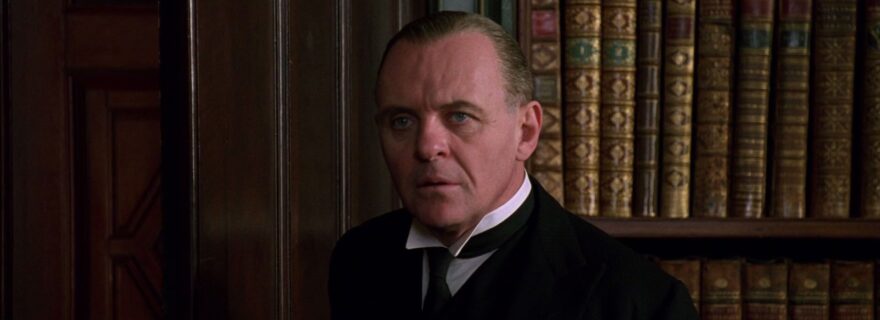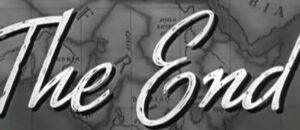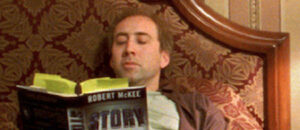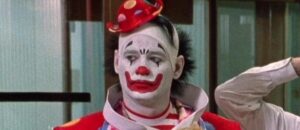Most times, when people think about movies adapted from novels, the inevitable conclusion is that the book was better. Every so often, however, a film will come along that successfully captures, or even improves upon, its source.
Deirdre Crimmins
One of the better book adaptations to make it on screen has to be Coraline. If you had told me before the film was released that Henry Selick, Neil Gaiman, and They Might Be Giants were all working on a project together, I would have accused you of reading my dream journal. Beyond the natural fit of all the elements coming together, Selick made some crucial changes that allow the written story to work well up on a screen. The biggest adjustment was the creation of the neighbor boy, Wybie. He’s nowhere to be found in the book, and serves as a great sounding board for all of Coraline’s issues with her parents and her new home. Simply put, isolated kids make great books, but not great movies, and Coraline figured that out perfectly. Also, the stop-motion animation dreamily lends itself to the surreal Gaiman-verse quite nicely.
David Krauss
Atonement is one of my favorite books, and thankfully screenwriter Christopher Hampton possessed a similar degree of reverence and respect for the original novel by Ian McEwan. Hampton’s Oscar-nominated script brings the book to life like few screenplays do, resulting in an incredibly faithful and rewarding film adaptation.
With its three-act structure, which chronicles the life of its heroine, Briony Tallis, at three different ages, Atonement isn’t the easiest tale to translate to the screen. There’s also the issues of multiple flashbacks and perspectives muddying the cinematic waters. Hampton, however, masterfully dodges the pitfalls, while Joe Wright’s poetic, ambitious direction infuses the tragic romance and tale of jealousy, revenge, and everlasting regret with as much power, beauty, and emotional resonance as McEwan’s book. Hampton admirably resists any temptation to stray from McEwan’s blueprint by “opening up” or restructuring the story. What works on the page works on the screen, making Atonement one of those rare films that’s just as good as the book upon which it’s based. The only thing that’s not in the novel, of course, is that utterly glorious, supremely challenging, and perfectly executed five-and-a-half-minute tracking shot on the beach at Dunkirk. That’s one addition I’ll be forever thankful for!
Brian Hoss
The 2017 film The Foreigner is a recent favorite of mine. Although the novel it’s based on is very similar, the movie is better in almost every way. Dialing into why the movie is better means recognizing the quality of the production, from the strong, well-delivered cast, to the pacing and execution of the action, espionage, and drama elements within the careful plot turns. The plot for the movie follows the book very closely, but there’s enough change in setting that the movie feels tighter and also dark enough even without the ending in the book.
M. Enois Duarte
One of my favorite film adaptations is Michael Mann’s The Last of the Mohicans. Granted, the historical romance epic is really more of a remake of George B. Seitz’s 1936 film than a direct adaptation of James Fenimore Cooper’s 1826 novel. Still, of the eight times the book has been translated into film, Mann’s version is easily the best and most memorable, a beautiful and visually mesmerizing translation. Without going too deeply into it, the book is notoriously bad for romanticizing the Euro-Americans as the virtuous heroes while indigenous people are portrayed as simple-minded primitives or, at best, the offensive stereotype of the noble savage. Besides, the book is terribly written, and Cooper was a terrible writer, remembered only for this second book in the Natty “Hawkeye” Bumppo adventures.
Josh Zyber
For as acclaimed as many of their movies had been, something about the Merchant-Ivory filmmaking collaboration (director James Ivory and producer Ismail Merchant) typically left me cold. The rigid formalism and aloof storytelling often make their films feel like handsomely mounted literary illustrations, suitable for programming on public television but rarely rising to the level of great cinema in their own right. The one exception to this, for me, is The Remains of the Day, the pair’s 1993 adaptation of a Booker Prize-winning novel by Kazuo Ishiguro.
Ishiguro’s prose is frequently difficult to adapt, but the tale of a repressed English butler’s (Anthony Hopkins) unrequited love for another household servant (Emma Thompson) is almost perfectly suited for the Merchant-Ivory sensibilities. The adaptation by screenwriter Ruth Prawer Jhabvala condenses some of the plot a little, as just about any movie must, but nails the author’s delicate tone. The Remains of the Day achieves what most Merchant-Ivory movies could not, a combination of impeccably tasteful filmmaking with an engrossing and emotionally involving story that takes on a life of its own.
The film was nominated for eight Oscars, including Best Picture, but wound up being steamrolled in most categories by Schindler’s List, which I suppose speaks to what a great year for movies 1993 was.
Your Turn
What books have you found to make successful transitions to the screen?





Bill McClain
If by “best” we mean closest to the text: Polanski’s TESS does that.
Anyone who says Peter Jackson and Tolkien: I will find you.
njscorpio
I always enjoyed Heston’s ‘The Ten Commandments’.
photogdave
Leaving Las Vegas is an excellent film adaption of (IMHO) a barely readable novel.
The Godfather transcends the source material and turned a pulpy novel into a 20th century cinema classic.
Master and Commander: Far side of the World does an amazing job of distilling and entire series of superb novels of historical fiction into one fantastic film.
EM
Hitchcock frequently adapted novels. He wasnʼt, however, looking to make definitive adaptations of deathless prose; he was looking for raw material to shape into a cinematic experience. A prime example is Psycho. As I recall (Iʼm away from my books), François Truffaut called Robert Blochʼs source novel honteusement truqué (“shamefully gimmicky”) in its treatment of the Norman–Mother relationship and much preferred Hitchʼs handling; indeed, we all do. Without Hitchcockʼs film, Blochʼs novel would today be just another largely forgotten bestseller.
EM
I’m still away from my books, but yesterday in a bookstore I spotted a copy of the book in question (Hitchcock–Truffaut) and verified the quotation. Even I was surprised I was right!
Bolo
‘The Tin Drum’ (‘Die Blechtrommel’) does a great job getting the novel’s story surreal up on screen in a sincere way. Criterion released this one. Unfortunately, between the DVD release and the blu ray, the director put together a director’s cut that I feel is inferior; and that’s the cut that is on the blu ray. So whenever I watch this film, it will be in standard def.
And as an Elmore Leonard fan, ‘Jackie Brown’ is my favourite adaptation of his works. Leonard was a big influence on Tarantino, and so their styles are very compatible. Tarantino brings his own stylings to the presentation and even reimagines the book as more of a neo-blaxploitation film (and cast the queen of the genre in the lead role), yet it captures Leonard’s strengths better than adaptions of his works that were technically more faithful. Tarantino has sat on the rights to my favourite of Leonard’s novels, ’40 Lashes Less One’, for decades now. I’d love to see him bring that one to the big screen, but I don’t get my hopes up.
Bill
I have to say The Godfather’s 1&2. The books were practically scripts. IMHO
Csm101
The Silence of the Lambs was very faithful to the source and is a classic. The Exorcist as well.
Judas Cradle
Naked Lunch.
Cronenberg said that the best way to adapt and honor the book was to first throw away the book.
(Meaning – don’t be a literal adaptation).
Many films fail in their adaptations because they try too hard to be a replica of the printed material: which is a recipe for disaster (see Watchmen).
Dances With Wolves was also a damn good adaptation of Michael Blake’s novel. (It knew what to throw out, what to keep, and what to adjust).
Points to Mr. Duarte – James Fenimore Cooper was an awful writer- we only remember him because he was the first American novelist- not because he was any good.
Shannon Nutt
People can complain about what was left out and/or slightly changed, but for 8 movies they did a pretty darn good job adapting the Harry Potter novels.